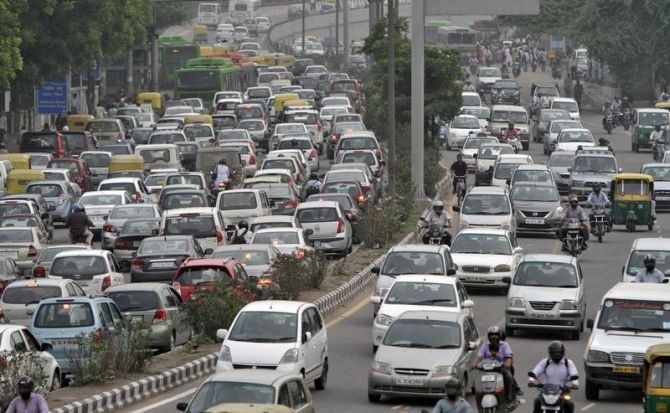The ministry also wants to extend support to states through a special provision from the proposed Rs 25,000 crore fund for electric bus and personal rapid transport initiatives.

Planning to decongest cities and improve transportation, the Union road transport ministry has sought an additional Rs 25,000 crore as budgetary support for 2018-19.
Union Highways Minister Nitin Gadkari recently wrote to Finance Minister Arun Jaitley seeking around 18 per cent increase in budgetary allocation for his ministry.
For 2017-18, the government allocated Rs 64,900 crore to the ministry of road transport and highways.
The Rs 25,000 crore sought for 2018-19 is in addition to Rs 79,000 crore the ministry has asked for other programmes.
The government is also likely to announce a Rs 2,000 crore plan for procurement of electric buses in the forthcoming Union Budget.
The road transport ministry is looking at decongesting major cities, supporting innovative solutions like personal rapid transport and electric buses, developing bus ports, and assisting state transport undertakings in improving their bus fleets.
The ministry has also drawn up Rs 15,000 crore plan to decongest cities.
“The plan is to decongest cities like Delhi, Mumbai and Bengaluru through innovation in urban transportation. The states require financial aid for this from the central government, which cannot be met through the standard budgetary support the ministry receives every year,” an official said.
The ministry also wants to extend support to states through a special provision from the proposed Rs 25,000 crore fund for electric bus and personal rapid transport initiatives.
Of this, Rs 2,000 crore will be for the procurement of electric buses. An equal amount will be spent on promoting personal rapid transport like pod taxis.
The government will soon seek expressions of interest for launching the country’s first driverless pod taxi system on a 70 km stretch from Dhaula Kuan in Delhi to Manesar in Haryana.
The Centre also envisages development of bus ports in collaboration with states in major cities and plans to set aside Rs 2,000 crore as part of viability gap funding for the purpose.
The road ministry has envisaged a model of operation for state transport undertakings on the lines of Transport for London, a local government body responsible for the transport system in Greater London.
In the plan, state transport undertakings will not incur any capital cost in buying fleets of buses and will instead invite tenders from companies seeking a guaranteed number of kilometers a bus will ply per day.
The fare will be decided by the state government, which will, in turn, be supported by the Centre.
Photograph: B Mathur/Reuters












 © 2025
© 2025